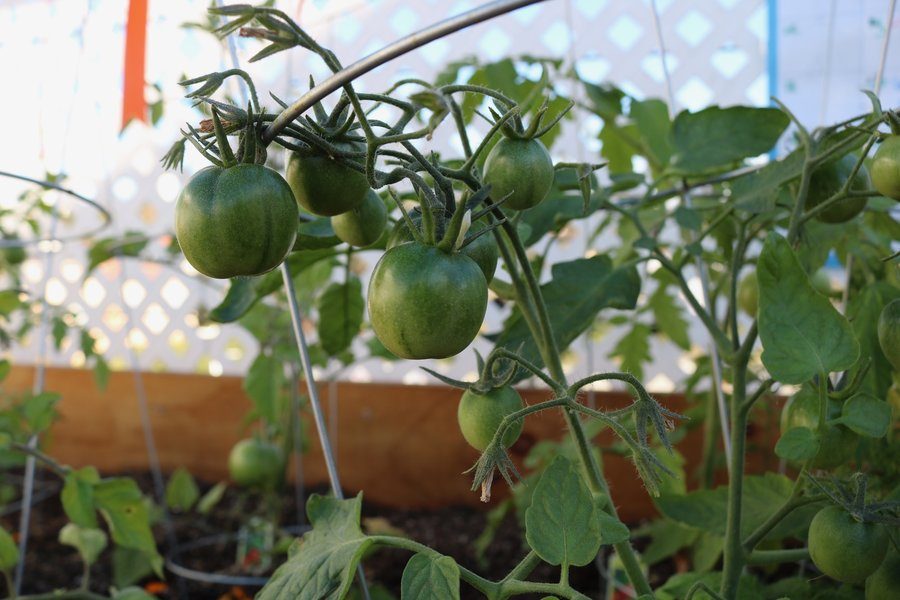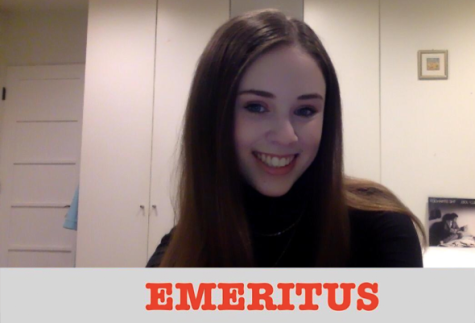I’ll have the caprese: New student-tended rooftop garden offers herbs to pick, vegetables for sale
January 3, 2018
Ashley Evins usually eats caprese salads as a treat, and rarely has the opportunity to use fresh basil. But since the planting of a new flower and vegetable garden on the roof, members of the Shalhevet community now have the opportunity to stop by and pick fresh herbs of their liking.
Ms. Evins, Director of Student Support, has been enjoying caprese more often.
“The basil definitely tasted really fresh,” said Ms. Evins. Compared to basil that she’s used to, she said, “It tasted sweet and crisp.”
This year, the Green Team environmental club changed many things around the school and added new attractions, one being the garden, which was planted on Oct. 17.
Along with basil, there are eight other herbs that can be found growing in the garden, including thyme, sage, parsley, and rosemary. Strawberries — three fruits have already grown, two of which were eaten by the garden organizer Maia Zelkha and one by her Uber driver — along with tomatoes, romaine lettuce and marigold flowers are there as well.
Beginning today, the vegetables are being auctioned to raise money for the seniors’ Poland-Israel trip.
Three tomatoes were put up for sale for $5 on Schoology during lunch. Freshman Maya Vaakil bid $6, and then receptionist Daniella Silva raised it to $7.
“You ever have a grilled tomato with lemon juice, olive oil and salt?” wrote Ms. Silva.
“Best. Snack. Ever.”
Positioned in full sun near the northeast corner of the roof, the garden is currently being watered twice a day by student and faculty volunteers, according to Maia, anyone can help.
“I think the garden is going to help get kids, they don’t even have to be so passionate about social justice for the environment,” said Maia Zelkha, the day the garden was planted. “Just taking care of the garden and observing and helping out is exciting.”
A transparent mini-greenhouse with green edges stands next to the garden and holds various small pots with seedlings such as squash. It’s clear plastic walls keep the small plants warm while letting in sunlight. A long zipper runs down the side to open it.
Inside the greenhouse is a sign-in sheet on a clipboard where people write their name, the date, and a few general notes on what is growing, each time they water the plants.
Freshman volunteer Sophie Handelman wrote on Dec. 11, “Tomatoes are turning red!”
“Everything looks amazing!” wrote freshman volunteer Yael Rubin Dec. 12.
Members of the Green Team think the garden adds a lot to the school.
“The garden makes Shalhevet more of a nature community,” said Yael. “It adds color and it’s pretty and nice… I connect to nature a lot more.”
Along with adding the garden, the Green Team made a collective decision over the summer to redo the trash bin system. In places where students eat, such as the cafeteria and the roof, there are now two different types of trash bins, one for food waste and one for paper and plastic waste.
Food waste, including newly biodegradable containers and utensils — goes in the green while regular trash is thrown in the black bin.
“You may think, oh it’s just one cup, or oh it’s just one plastic bag, but it really builds up,” said Maia.“Our school probably produces landfill upon landfill of waste.”
Last year the Green Team sponsored a program called “Blue is the new green,” which included two bins — a blue bin and a green bin — but students didn’t fully understand what could and couldn’t be thrown into which bin, according to Maia.
So this year’s group decided to simplify it. Now, black bins contain regular trash, paper and plastic, which are sent to an offsite place to be recycled, while food waste from green bins is hauled away to be composted.
What paid for these changes is a $10,000 grant called The Gendler Grapevine Project Grant, which was won by Shalhevet and Ikar, the synagogue that uses the building on Saturdays and Tuesday afternoons. The objective of the grant was to help with greening efforts in the building.
Around the same time, Admissions Director Natalie Weiss, faculty adviser of the Green Team, found out about a new California law called Recycle LA, which requires businesses to further reduce trash.
Shalhevet and Ikar directed much of the money compostables and the compost bins, along with the potted fruit trees added to the rooftop last spring. Money from the grant was given also to Netiya, an organization that also helps care for the fruit trees.
Also different this year are the school’s containers for hot lunch, which are catered by local restaurants. Over the summer, Muriel was able to contact the restaurants and ask them to change the lunch containers and utensils so they would all be biodegradable, which means they can decompose into the ground and become soil and compost.
“We knew it was better for the environment to switch to compostables,” said Ms. Weiss. “We also knew that it was going to be easier for anyone who gets lunch, students and faculty, to be able to toss it all in the green bin and not have to dump food in the green bin, and their trash in another bin.”
One of the future changes they’re planning is to add a blue bin for recyclables. That’s because under the current set-up, when the trash is taken out of the black bin, the recyclables have to be sorted out by the trash company. The extra bin would mean that they would not have to do this.















Daniella Silva (Front Desk)
Best. Snack. Ever.